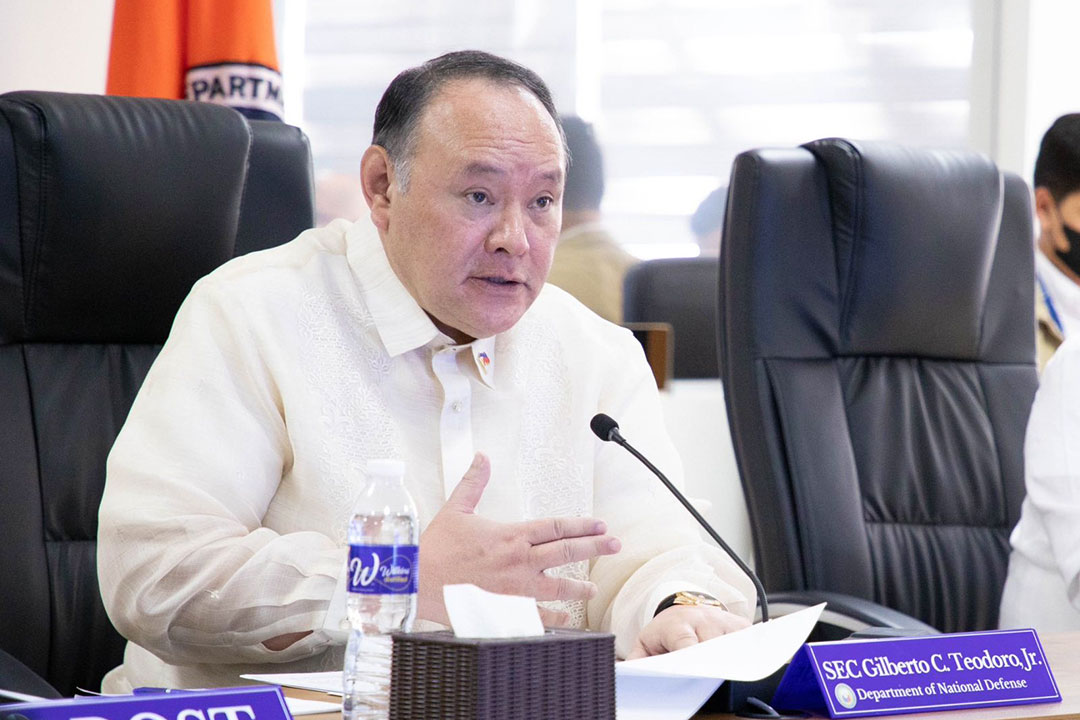Philippines says it’s under pressure from China to cede claims in South China Sea

By John Victor D. Ordoñez, Reporter
CANBERRA — China is putting ever-greater pressure on the Philippines to cede its sovereign rights in the South China Sea, Defense Secretary Gilberto Eduardo Gerardo “Gibo” C. Teodoro, Jr. said on Tuesday after a meeting with his Australian counterpart in Canberra.
“What we see is an increasing demand by Beijing for us to concede our sovereign rights in the area,” he said, adding that the Philippines is a “victim of Chinese aggression.”
China and the Philippines have sparred repeatedly this year over disputed areas of the South China Sea, including the Scarborough Shoal, one of Asia’s most contested features.
Mr. Teodoro’s meeting with his Australian counterpart Richard Marles, their fifth since August 2023, reflects growing security ties between the countries, both of which have expressed concern about Chinese activity in areas of the South China Sea claimed by the Philippines and other Southeast Asian nations.
The two nations signed a strategic partnership in September 2023 and held their first joint sea and air patrols in the South China Sea several months later. The Philippines also joined war games in Australia this year for the first time.
China claims almost the entire South China Sea, a conduit for more than $3 trillion of annual ship-borne commerce, including parts claimed by the Philippines, Vietnam, Indonesia, Malaysia and Brunei. The Permanent Court of Arbitration in 2016 said China’s claims had no legal basis, a ruling Beijing rejects.
Mr. Teodoro said China’s claims and behavior are contrary to international law, and defense deals with partners such as Australia are an important way to deter Chinese incursions.
“Although they (China) claim to act under the aegis of international law, everybody knows that what they’re doing is contrary to the tenets of international law,” he said. “The biggest evidence of this is that nobody has actually supported their actions or activities.”
In addition to closer ties with countries including Australia and the US, the Philippines also plans to spend at least $33 billion on new weapons including advanced fighter jets and mid-range missiles.
Mr. Marles said Australia wants to work more closely with the Philippine defense industry and would send an engineering assessment team to the country early next year.
Meanwhile, the Philippine and US Coast Guards held simulation exercises on maritime law enforcement, border security and illegal fishing as part of their efforts to ensure peace and stability in the region, the US Embassy in Manila said.
In a statement, the embassy said both coast guards held a technical workshop on maritime law in Bataan in northern Philippines on Nov. 5 to 7 that also had participants from maritime law enforcement agencies from Indonesia, Malaysia, Thailand and Vietnam.
It said 30 delegates engaged in scenario-based simulation exercises that aimed to improve maritime law enforcement.
At the workshop, Philippine Coast Guard (PCG) Deputy Director Captain Noriel P. Ramos said the venue was used to “discuss and collaborate on maritime law enforcement efforts for regional stability to ensure a free and open Indo-Pacific.”
This comes amid worsening tensions between the Philippines and China as Beijing continues to block resupply missions at Second Thomas Shoal, where Manila has a handful of soldiers stationed at a World War II-era ship that it grounded in 1999 to bolster its sea claim.
The PCG has borne the brunt of Chinese intrusions into the Philippines’ exclusive economic zone in the South China Sea, which Beijing claims almost in its entirety.
Manila and Beijing have repeatedly clashed in the waterway, accusing each other of aggressive behavior involving their ships and of damaging the marine environment.
PCG Commandant Admiral Ronnie Gil L. Gavan last week said the PCG is set to receive 49 new ships by 2028, 40 of which are funded by a French loan worth P25.8 billion and five from Japan, to boost patrols in the waterway.
US Embassy Deputy Director Luke Bruns said at the workshop that the exercises and exchange of expertise aimed to boost Washington’s “maritime cooperation among Southeast Asian partners.”
The Chinese Foreign Ministry late Sunday published territories and baselines around Scarborough Shoal, asserting its maritime claims.
China has controlled Scarborough, which falls within the Philippines’ exclusive economic zone but is also claimed by several other countries, since 2012 after maintaining constant coast guard presence there, according to the Asia Maritime Transparency Initiative.
Meanwhile, the Philippines’ National Maritime Council on Tuesday opposed the baselines, saying it was a continuation of China’s “illegal seizure” of the shoal in 2012.
“The straight baselines established by China around the shoal are without any legal basis or effect,” it said in a statement. “The Philippines strongly objects to the use of these baselines by China and resolutely maintains its right to declare the correct baselines around Bajo de Masinloc (Scarborough Shoal).”
Philippine President Ferdinand R. Marcos, Jr. has signed into law a measure that defines Philippine territories within its exclusive economic zone amid China’s growing assertiveness in the South China Sea.
The President has also vowed to upgrade the assets of the PCG. China has opposed the law, saying it illegally includes parts of Chinese territories in the waterway.
The Philippine Senate has also passed a bill that seeks to set up sea lanes at the Balintang Channel, Celebes and Sulu Seas, among other waterways, to assert Philippine sovereignty.
“The Philippine Maritime Zones Act is a legitimate exercise of the country’s right to determine and declare its maritime zones, consistent with international law,” the country’s maritime council said, citing the 1982 United Nations Convention on the Law of the Sea.
“The Philippines reiterates that it has always had sovereignty and jurisdiction over Bajo de Masinloc and that its maritime zones are consistent with international law and do not impinge on the sovereignty or jurisdiction of other states,” it added.



